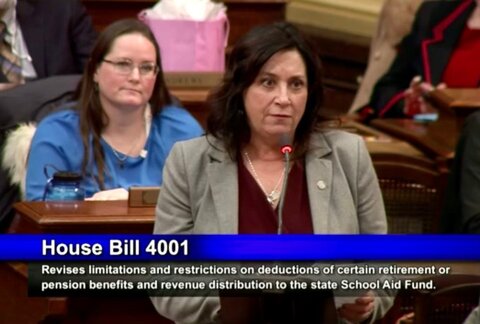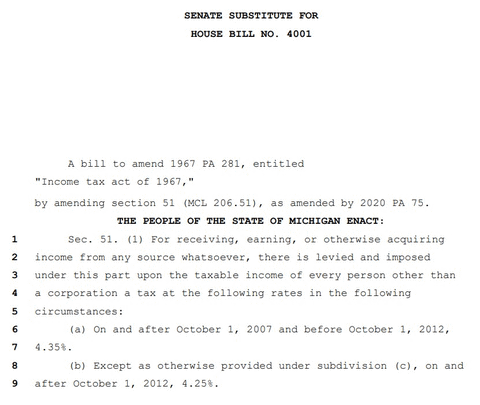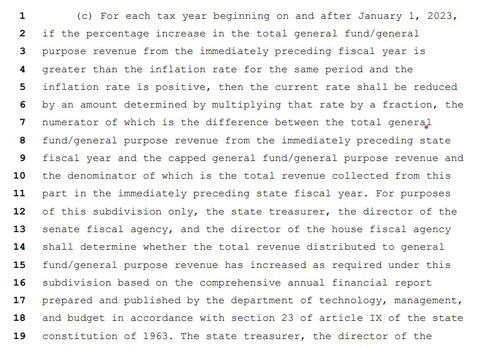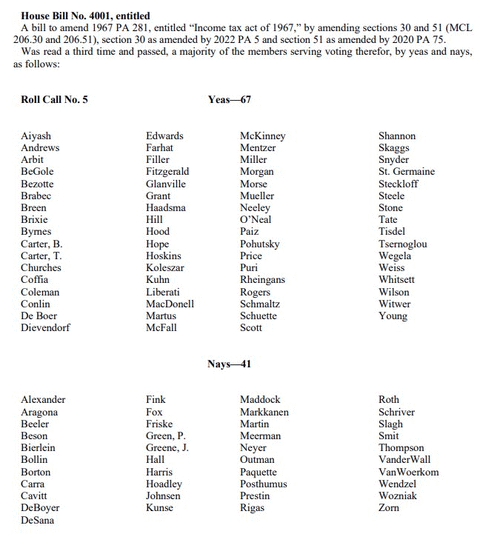Senate Republicans can stop Whitmer’s attempts to trade income tax cut for corporate welfare
Whitmer’s great switcheroo must work on a tight timeline. Will Senate Republicans preserve a tax cut for their voters?
An automatic income tax cut in Michigan is being threatened by Gov. Gretchen Whitmer’s budgetary maneuvers, reports out of Lansing say.
David Guenthner, the Mackinac Center’s vice president for government affairs, wrote in The Detroit News that “one strategy mentioned around the state Capitol would be to transfer $800 million of last year’s general revenue into the state’s corporate welfare fund and backdate the transaction to last September.”
The transfer would forestall a requirement in law, tied to revenues and inflation, that would require the state to give Michigan residents a permanent income tax cut.
Hence all the talk in Lansing this year about “closing the books” on the 2021-22 fiscal year.
“However,” Guenthner adds, “the viability of such a movement is both logically and legally suspect.”
The maneuver is contained in the shell of a bill known as House Bill 4001. It was the first bill in the House this year, introduced on Jan. 12 by Rep. Angela Witwer, D-Delta Township.
Here’s how the Senate-passed version of House Bill 4001 talks about taxes between 2007 and 2022:
Here’s how it talks about taxes in 2023. From one page to the next, the bill’s language turns from clear and simple to opaque and inaccessible.
Regardless of the bill’s accessibility or lack thereof, Gongwer News reports that it would need not only to pass, but to take immediate effect if it were to stop the income tax cut. That means it would need a two-thirds vote in both chambers.
A two-thirds vote would require that six Republican senators cross party lines and vote with Democrats against a tax cut for individuals, and in favor of corporate welfare.
The Gongwer report adds that “Democrats also are said to be offering up potential projects to Republicans in their districts to win votes.”
When House Bill 4001 was taken up by the Senate, it only passed 20-18, along party lines. The House version, passed earlier in a much different form, passed 67-41. The earlier version passed by the House dealt only with repealing the pension tax.
These 11 Republicans voted with the Democrats on the earlier version of House Bill 4001:
- Rep. Brian BeGole, R-Perry
- Rep. Bob Bezotte, R-Marion Township
- Rep. Nancy DeBoer, R-Holland
- Rep. Graham Filler, R-Duplain Township
- Rep. Thomas Kuhn, R-Troy
- Rep. Mike Mueller, R-Linden
- Rep. Kathy Schmaltz, R-Jackson
- Rep. Bill Schuette, R-Midland
- Rep. Alicia St. Germaine, R-Harrison Township
- Rep. Donni Steele, R-Orion Township
- Rep. Mark Tisdel, R-Rochester Hills
The bill would need to take immediate effect because the books for the 2021-22 fiscal year officially close in March. The maneuver wouldn’t work if it does not transfer enough money from this year to last year to avoid triggering the tax cut.
The bill would head to conference committee so differences between the House and Senate bills could be ironed out. After the conference committee comes up with its version, both legislative chambers would need to pass the bill again, and with the required two-thirds vote.
State Rep. Andrew Fink, R-Hillsdale, took to the House floor Thursday to decry the rushed nature of the bill.
“What is the new Democratic majority afraid of?” Fink also tweeted, linking his speech on the House floor. “Why are they hiding what will be in HB 4001?”
Fink told CapCon that while the initial version of House Bill 4001 drew wide support, the changes could make Republicans less likely to support it once it leaves the conference committee.
Fink is in his second House term. He worries for his first-term colleagues who, in a month in Lansing, have seen big bills rushed through without committee votes, hearings, or testimony.
“They’ve never known normal order,” Fink told CapCon Friday. “They’ve not worked through the committee process.”
Members in the House give a bill immediate effect by a voice vote, which offers the minority no chance to push back. But in the Senate, an official tally decides.
This means it would take 26 out of 38 senators to vote yes. Democrats have 20 members, so six Senate Republicans would need to cross party lines.
Last month, four Senate Republicans crossed party lines to support Senate Bill 7, a $946 million spending package. The four Republicans were John Damoose, Mark Huizenga, Dan Lauwers and Ed McBroom. Getting to 26 votes would require Democrats to retain the support of those four Republicans, plus win over two others. Those Republicans would need to be willing to engage in budgetary sleight-of-hand to cancel a tax cut for their voters.
“This is a time when Republicans could say no and actually get what they want,” James Hohman, the Mackinac Center’s director of fiscal policy, told CapCon.
It’s not every day the minority party can actually stop the majority. But today is that day, and House Bill 4001 is that bill.
What happens next will offer a window into the next two years. Do your representatives represent you? Next week we will find out.
James David Dickson is managing editor of Michigan Capitol Confidential. Email him at dickson@mackinac.org.
Michigan Capitol Confidential is the news source produced by the Mackinac Center for Public Policy. Michigan Capitol Confidential reports with a free-market news perspective.





